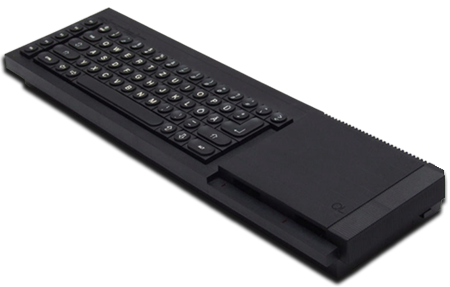News
News Archive
Downloads
Articles
Links
--------------------------
The Games
- The Pawn
- The Guild Of Thieves
- Jinxter
- Corruption
- Fish!
- Myth
- Wonderland
- The Magnetic Scrolls
Collection Vol. One
- The Legacy - Realm
Of Terror
--------------------------
Magnetic Interpreter
--------------------------
The Message Board
Guestbook
--------------------------
About The Website
Contact
|
|
Fish!'n
(Micro)Chips - an Interview with Peter Kemp (page
2)
|
|
Had
you heard of Magnetic Scrolls before your time working there?
No. I met Anita (Sinclair) and Ken (Gordon) via John Molloy.
As I remember, I was visiting John one time when we took a detour
to meet Anita. (I can't remember the reason.) This was the early
days of Magnetic Scrolls. Anita and Ken were able to demonstrate
an *early* version of what was to become 'The Pawn'. It was
clear, even at that time, that the Magnetic Scrolls parser was
significantly more sophisticated than the one used by Infocom.
How
impressed were you by that demonstration?
Until I saw the first Magnetic Scrolls parser, there were
really only two flavours:
a) the
strict two-word parsers, such as found in the Scott Adams adventures.
Verb + noun pair.
b) the
'flexible' two-word parser created by Infocom. (I can't think
of anyone else.) This was still pretty much verb/noun pair,
but it allowed you to create compound commands (eg "Get
bucket and sword then go east" all on one line, rather
than having to type in three separate commands.) It was also
a lot smarter, being able to answer questions with jokey responses
(eg it would respond to the question "What is a grue?")
The Magnetic
Scrolls parser seemed to be everything the Infocom parser could
do, with added bells and whistles. I can't remember the exact
details, but I seem to remember Anita showing how it could handle
adjectives (eg get yellow bucket). Even better, it could handle
ambiguous statements (eg "Get bucket". "Which
bucket, the red bucket or the blue bucket?". "Blue".
"You pick up the blue bucket".)
Were
the plot and the puzzles already in place in that version of
the game?
I'm sorry to say I can't remember
any particular plot or puzzle elements from what we saw at that
time.
One
minor snippet - the development team was using Sinclair QL machines,
which were - for the time - absolutely the leading edge technology.
(Sometimes called the 'bleeding' edge.) The microdrives were
ever so impressive.
|

The ill-fated Sinclair QL - cutting-edge technology from the mid-eighties
|
Since
you mentioned the QL (I think that stood for "Quantum Leap",
didn't it?) - were you actually surprised that, despite the
QL's rather impressive technology, it did fare so poorly in
the end?
The history of Sinclair machines is a little complicated.
The ZX-80 and ZX-81 were truly groundbreaking. For all their
(many!) faults, they did offer a (sort-of) usable machine at
a (sort-of) affordable price to just about anyone. For that,
Clive Sinclair deserves to be acknowledged and applauded.
However,
it's my opinion that he is/was more of a 'boffin' rather than
a businessman. In a number of cases, products were hyped beyond
what they could actually deliver - the C5 'electric car' being
a classic example. In the case of the ZX-80 - and particularly
the ZX-81 and Spectrum - the sheer ingenuity of users managed
to exceed the machines' shortcomings.
The
QL suffered because of this. As I remember, the machine was
promised before it was properly finished and physically available
for delivery. In addition, the machine was forced up a blind
alley by insisting on the microdrive for mass storage. In theory,
the microdrive was a wonderfully clever piece of hardware, but
its high failure rate in the early days meant it wasn't satisfactory
in the real world. People began to realise locking themselves
into proprietary hardware was a bad idea and there were plenty
of alternatives on the market.
|
|
How
would you rate machines like the Atari ST and the Commodore
Amiga? Especially the Amiga did create quite a stir when it
was introduced to the public ...
Oh, the ST and the Amiga...! Both were great machines, hampered
by price and lack of software. I think both were superior technically,
but the UK market was dominated by two groups: the ZX-81/Sinclair
Spectrum and the Amstrad CPC machines. I believe those two groups
accounted for a major percentage of the market, leaving pretty
much everything else (Apple ][, Macintosh and IBM PC) scrambling
for the remaining share. Because they were imported from the
US, they weren't helped by greedy companies over-charging: simply
substituting a £ sign for the $ price. (OK, I know we
have VAT in the UK, but that ran at 17.5% whereas the importers
were (roughly) doubling the price.) Against that sort of competition,
the 'home grown' machines appeared much better value for money.
(Most people, I think, were playing games and weren't really
interested in features that added nothing to the game-playing
experience.)
As
memory serves, wasn't the Amiga a particularly big success in
Germany?
Well,
I daresay that Commodore pretty much dominated the German home
computer market in the eighties, first with the Commodore 64
and later with the Amiga. How was the situation in the UK?
In the UK, the Amstrad series of machines were wildly successful.
Alan Sugar had a knack for delivering good value for money machines.
Nothing
fancy, but they did what they said they'd do. One of the reasons
he was so successful was that he included a lot of very good
documentation with the machines (really, very good and accessible
to a non-technical audience). More compellingly, however, was
that he made it simple to *use* the machine: "plug this
into that, turn on the power and press this button" sort
of thing. For a reasonable price the user got a decent processor
and memory, a proper keyboard, CP/M operating system and a 'proper'
printer (even though it wasn't really, but that's another story).
The consumer could buy a machine in the morning and be printing
off their first page of word processing in the afternoon. Revolutionary...
|
Previous
page / Next page
Back
to Articles page
|


